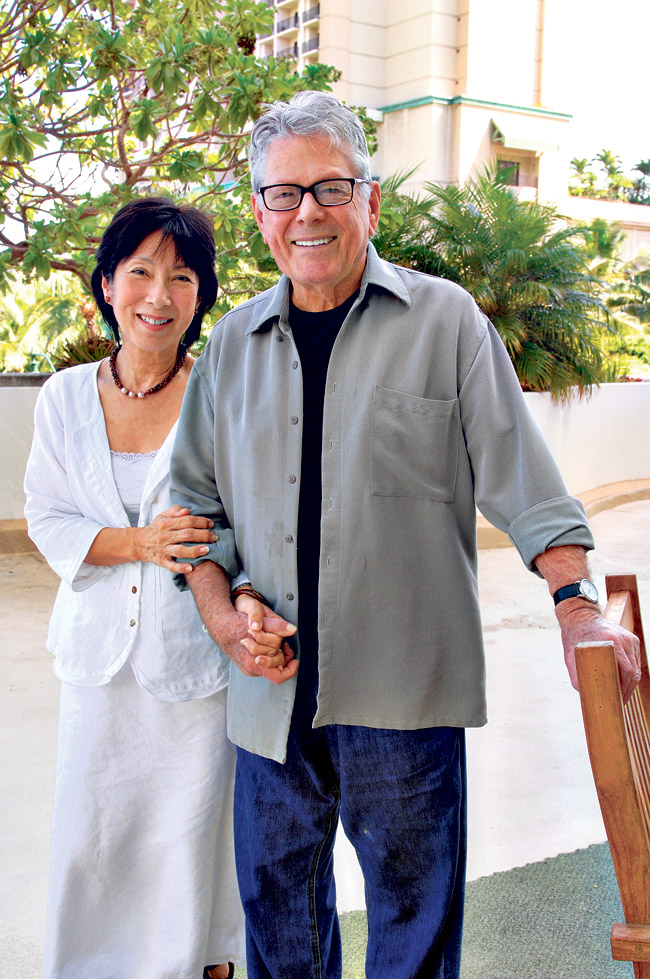A Three-dot Tribute To Eddie Sherman
On the day Dave Donnelly died in January 2004, I returned home from a dinner to find this phone message from a friend: “Don, I just heard you died. Please call me.”
That was never going to be the case with Eddie Sherman, and not just because I was called on more than one occasion “Don Davelly.” In the small and slightly strange fraternity of Honolulu three-dot columnists – of which I was a part for 13 years – Eddie was the only one who seemed as big and unique as the celebs he covered.
We wrote the same column for the Honolulu Advertiser, separated by the tenures of Tom Horton and George “Daacon & Eggs.” And when I became MidWeek‘s editor in 1994, Eddie had been writing a dot-dot-dotter here for eight years, and would continue for another 11 years. Thus for the final two years of my Advertiser ride Eddie and I were competitors, and then for more than a decade I was his boss. We became friends, and in some ways I saw him as a sort of father figure.
So when I got the news of his passing last week – nine years and two days to the date since Donnelly’s passing, and one month shy of Eddie’s 89th birthday – it was with a mix of emotions and memories.
I’d last spoken with Eddie on New Year’s Eve – part of my personal tradition on that day of calling old friends with whom I haven’t spoken for a while. We talked for nearly 40 minutes, and it was typical Eddie.
As always, I asked about his health – he’s had heart issues for years, has dealt with diabetes for longer and beat a brain tumor with surgery. Eddie, part of the great tradition of Jewish comics, replied: “Well, I checked today and I still have a pulse!” He also had an X-rated quip about what the weather “forecast” had in store for him, “with a possibility of (something rising).” As usual, both one-liners had me laughing.
As much as I’ll miss talking with Eddie, instead of sadness I am filled with a sense of gratitude for having known him for so long and so well, and having shared a position that requires you to come up with 20 or more good stories a day, and to tell them in a quick and entertaining manner – no matter how many words you have to make up or rearrange the spelling. I always joked with Eddie that his column shut down our system’s spellcheck more than once.
If ever there was a time to celebrate a life, this is it. He was born poor to parents who divorced when he was young, and he ended up in an orphanage. Yet he grew up to become pals with Frank Sinatra, John Wayne, Marlon Brando, Sammy Davis Jr. and more. In his Advertiser days, he helped discover a young Honolulu stage talent who would become an international star, Bette Midler. Those were simpler times, but the media always has been the media and big-name stars have always been wary. Eddie’s early hero was Walter Winchell, but Eddie got his scoops by befriending the stars and being positive.
Eddie also was blessed with an innate curiosity, the greatest gift a journalist can have, and he took great interest in other people’s stories. He had a ton of tales about celebs, which, with little prodding, he was happy to recall – such as partying with Sinatra, and being amazed when Old Blue Eyes tipped bellmen at Canlis with $100 bills at a time when dinner for two cost considerably less than that. But one of the things that made Eddie great was his honest and enthusiastic curiosity about other people and their stories.
In our last conversation, Eddie wanted to know about my various book projects, and he also talked excitedly of projects he and wife Patty were involved with. He also spoke about the importance of physical exercise in his longevity. A longtime tennis player who had to give up the game a few years ago because of his knees, he was a devoted swimmer and water-exerciser to the end. Patty, the love of his life, kept him going for as long as he did by watching his diet and managing the diabetes.
By the way, another legend passed away recently, former Baltimore Orioles manager Earl Weaver. I was not even a cub reporter yet when I covered the 1973 American League playoffs, Baltimore against the A’s at Oakland – heck, I was just the sports editor of the University of Oregon’s Daily Emerald. Before the first game, I sat next to Weaver in the O’s dugout as he worked on a crossword puzzle book and answered questions. Something he said that October day has stuck with me ever since, and it pertains not just to baseball but to all of life. “I managed most of those guys in the minor leagues,” Weaver said, pointing his pencil to where his team was warming up on the field. “And most of them were not the most talented guys I had. What separates them is they have it here (he pointed to his head) and here (he pointed to his heart). That’s what really counts.”
Which reminds me of one of the great truths Eddie Sherman taught me: “It doesn’t matter how much talent a singer or musician may have. It’s about entertaining people and making them feel good.”
That was Eddie.
And dots all, folks.






